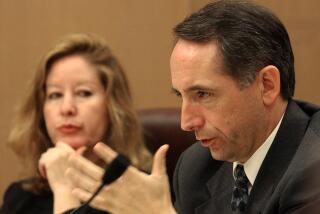Bar Won’t Act Against Brown in Wright Case
- Share via
The State Bar has decided to take no action against Assembly Speaker Willie Brown for contacting a judge who was hearing traffic charges against the daughter of Assemblywoman Cathie Wright (R-Simi Valley).
There was “an absence of compelling evidence” that Brown, a Democrat from San Francisco, violated its rules, the Bar said in a terse news release.
“Speaker Brown and the judge did speak,” Michael Saleen, the Bar’s assistant chief trial counsel, said Thursday. “However, our analysis disclosed that in the very short conversation that ensued there was no evidence there was a violation.”
The Bar’s 4 1/2-month investigation was prompted by a report in The Times in March that Brown, who is an attorney, had sought leniency with Municipal Judge Herbert Curtis III of Ventura County for Victoria Wright, the assemblywoman’s daughter.
The daughter, who has been cited for traffic violations 28 times since 1981, was in danger of going to jail or losing her license.
Prosecutor’s Allegation
Ventura County Dist. Atty. Michael D. Bradbury subsequently asserted that Brown telephoned Curtis shortly before he was to hear a misdemeanor charge against Victoria Wright for driving without a license and told the judge “that he did not believe Victoria deserved to go to jail.”
The allegation was part of Bradbury’s 97-page report on Wright’s alleged efforts to use her political clout to keep her daughter from losing her license or going to jail for 28 traffic violations since 1981.
The district attorney, who did not seek charges against Wright or Brown, referred Brown’s alleged contact with Curtis to the Bar Assn.
The Bar’s Rules of Professional Conduct generally prohibit members from contacting judges on a pending matter without the opposing attorney present. Brown was not representing Victoria Wright, but was still bound by this rule, Bradbury said.
The Bar can privately or publicly admonish, censure, suspend or disbar an attorney for misconduct.
Brown initially denied that he contacted Curtis but later said he “could very well have spoken” to Curtis, “but I have no recollection of calling him for any purpose.” In any case, he said, “Even if I had, it wouldn’t be improper.”
Saleen said that both Curtis and Brown’s attorney confirmed that the conversation occurred, but he refused to disclose what was said. Saleen said that the Bar’s inquiry determined that Brown initially called Curtis’ clerk to ask about the status of Victoria Wright’s case. The clerk then connected him to Curtis.
The decision not to charge Brown with a violation of the rules was based on a lack of evidence that the Speaker sought to intercede for Victoria Wright as well as uncertainty that the rule about contacting judges applied to him in this case, since he was not representing the lawmaker’s daughter, Saleen said.
Reacting to the Bar’s announcement, Brown’s press secretary, Susan Jetton, said: “We’re glad it’s over with. This is what we expected because the Speaker said from the beginning he hadn’t done anything wrong.”
Bradbury responded with angry words for the Bar.
“This may be a case of ‘Don’t bite the hand that feeds you,’ ” he said. “They are directly dependent upon the Legislature and the good will of the Legislature. Mr. Brown is a very powerful individual and pulls a lot of strings in this state.”
The Legislature sets the rates the Bar can charge its members for dues. The Bar also sponsors laws on behalf of its members and lobbies for their passage each year, said spokeswoman Anne Charles.
Brown, a graduate of Hastings College of the Law in San Francisco, was admitted to the California Bar in 1959 and maintains an active practice.
More to Read
Sign up for Essential California
The most important California stories and recommendations in your inbox every morning.
You may occasionally receive promotional content from the Los Angeles Times.













